We then feature another one of our recent thematic lists on Human Rights. However this time the list is a teaser only and we’ll issue a call for reviews later. What can we say: our previous lists have proven so popular that we have a full avalanche of reviews forthcoming… Time to get some of them out before getting more in!
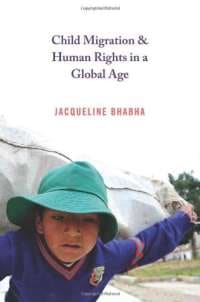 Bhabha, Jacqueline. 2014. Child Migration and Human Rights in a Global Age. Princeton: Princeton University Press. 392 pp. Hc: $35.00. ISBN: 9780691143606.
Bhabha, Jacqueline. 2014. Child Migration and Human Rights in a Global Age. Princeton: Princeton University Press. 392 pp. Hc: $35.00. ISBN: 9780691143606.
Spanning several continents and drawing on the actual stories of young migrants, the book shows how difficult it is for children to reunite with parents who left them behind to seek work abroad. It looks at the often-insurmountable obstacles we place in the paths of adolescents fleeing war, exploitation, or destitution; the contradictory elements in our approach to international adoption; and the limited support we give to young people brutalized as child soldiers. Part history, part in-depth legal and political analysis, this powerful book challenges the prevailing wisdom that widespread protection failures are caused by our lack of awareness of the problems these children face, arguing instead that our societies have a deep-seated ambivalence to migrant children—one we need to address head-on.’
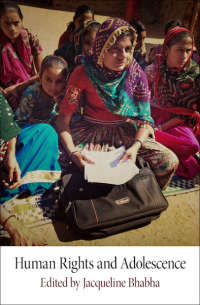 Bhabha, Jacqueline (ed.). 2014. Human Rights and Adolescence. Philadelphia: University of Pennsylvania Press. 376 pp. Hb: $69.95. ISBN: 9780812246315.
Bhabha, Jacqueline (ed.). 2014. Human Rights and Adolescence. Philadelphia: University of Pennsylvania Press. 376 pp. Hb: $69.95. ISBN: 9780812246315.
Human Rights and Adolescence presents a multifaceted inquiry into the global circumstances of adolescents, focused on the human rights challenges and socioeconomic obstacles young adults face. Contributors use new research to advance feasible solutions and timely recommendations for a wide range of issues spanning all continents, from relevant international legal norms to neuropsychological adolescent brain development, gender discrimination in Indian education to Colombian child soldier recruitment, stigmatization of Roma youth in Europe to economic disempowerment of Middle Eastern and South African adolescents. Taken together, the research emphasizes the importance of dedicated attention to adolescence as a distinctive and critical phase of development between childhood and adulthood, and outlines the task of building on the potential of adolescents while providing support for the challenges they experience.
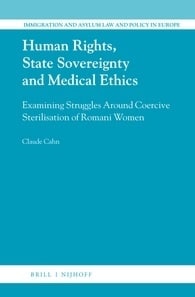 Cahn, Claude. 2014. Human Rights, State Sovereignty and Medical Ethics: Examining Struggles Around Coercive Sterilisation of Romani Women. Leiden: Brill. 340 pp. Hb: $194.00. ISBN: 9789004280335.
Cahn, Claude. 2014. Human Rights, State Sovereignty and Medical Ethics: Examining Struggles Around Coercive Sterilisation of Romani Women. Leiden: Brill. 340 pp. Hb: $194.00. ISBN: 9789004280335.
Human Rights, State Sovereignty and Medical Ethics: Examining Struggles Around Coercive Sterilisation of Romani Women examines the mobilized use by people and groups of the international human rights law framework to move legal, policy and ultimately social change at national and local level. One particular case study is examined in detail: efforts by Romani women in the Czech Republic and Slovakia to secure legal remedy for coercive sterilization. International legal aspects of these cases are examined in detail. The book concludes by endeavouring to answer questions concerning the nature of international law and the evolution of the post-World War II international human rights framework, the structure of national sovereignty, and the potential impact of both on human autonomy.
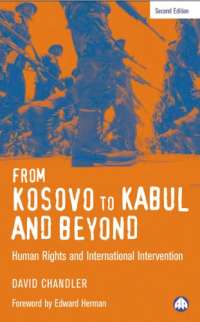 Chandler, David. 2005. From Kosovo to Kabul and Beyond. Human Rights and International Intervention. New York: Macmillan Publishers. 304 pp. Pb: $35.00. ISBN: 9780745325040
Chandler, David. 2005. From Kosovo to Kabul and Beyond. Human Rights and International Intervention. New York: Macmillan Publishers. 304 pp. Pb: $35.00. ISBN: 9780745325040
This new and updated edition of David Chandler’s acclaimed book takes a critical look at the way in which human rights issues have been brought to the fore in international affairs. The UN and Nato’s new policy of interventionism–as shown in Iraq, Somalia, Bosnia, Kosovo and East Timor–has been hailed as part of a new ‘ethical’ approach to foreign policy. David Chandler offers a rigorous critique of this apparently benign shift in international relations to reveal the worrying political implications of a new human rights discourse.
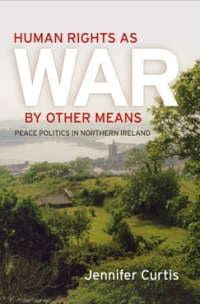 Curtis, Jennifer. 2014. Human Rights as War by Other Means. Peace Politics in Northern Ireland. Philadelphia: University of Pennsylvania Press. 296 pp. Hb: $69.95. ISBN: 9780812246193
Curtis, Jennifer. 2014. Human Rights as War by Other Means. Peace Politics in Northern Ireland. Philadelphia: University of Pennsylvania Press. 296 pp. Hb: $69.95. ISBN: 9780812246193
Human Rights as War by Other Means traces the use of rights discourse in Northern Ireland’s politics from the local civil rights campaigns of the 1960s to present-day activism for truth recovery and LGBT equality. Combining firsthand ethnographic reportage with historical research, Jennifer Curtis analyzes how rights discourse came to permeate grassroots politics and activism, how it transformed those politics, and how rights discourse was in turn transformed. This ethnographic history foregrounds the stories of ordinary people in Northern Ireland who embraced different rights politics and laws to conduct, conclude, and, in some ways, continue the conflict — a complex portrait that challenges the dominant postconflict narrative of political and social abuses vanquished by a collective commitment to human rights. As Curtis demonstrates, failure to critique the appropriation of rights discourse in the peace process perpetuates perilous conditions for a fragile peace and generates flawed prescriptions for other conflicts.
 Das, Arnab and Subrata Sankar Bagchi (eds.). 2014. Human Rights and the Third World: Issues and Discourses. New York:Lexington Books. 428 pp. Pb: £31.45. ISBN: 9780739197981
Das, Arnab and Subrata Sankar Bagchi (eds.). 2014. Human Rights and the Third World: Issues and Discourses. New York:Lexington Books. 428 pp. Pb: £31.45. ISBN: 9780739197981
Human Rights and the Third World: Issues and Discourses deals with the controversial questions on the universalistic notions of human rights. It finds Third World perspectives on human rights and seeks to open up a discursive space in the human rights discourse to address unresolved questions, citing issues and problems from different countries in the Third World.
 Jeffery, Renée. 2014. Amnesties, Accountability, and Human Rights. Philadelphia: University of Pennsylvania Press. 312 pp. Hb: $65.00. ISBN: 9780812245899.
Jeffery, Renée. 2014. Amnesties, Accountability, and Human Rights. Philadelphia: University of Pennsylvania Press. 312 pp. Hb: $65.00. ISBN: 9780812245899.
Amnesties, Accountability, and Human Rights examines why and how amnesties persist in the face of mounting pressure to prosecute the perpetrators of human rights violations. Drawing on more than 700 amnesties instituted between 1970 and 2005, Renée Jeffery maps out significant trends in the use of amnesty and offers a historical account of how both the use and the perception of amnesty has changed. As mechanisms to facilitate transitions to democracy, to reconcile divided societies, or to end violent conflicts, amnesties have been adapted to suit the competing demands of contemporary postconflict politics and international accountability norms. Through the history of one evolving political instrument, Amnesties, Accountability, and Human Rights sheds light on the changing thought, practice, and goals of human rights discourse generally.
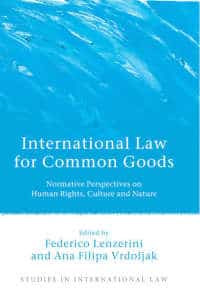 Lenzerini, Federico and Ana Filipa Vrdoljak (eds.). 2014. International Law for Common Goods: Normative Perspectives on Human Rights, Culture and Nature. Oxford: Hart Publishing. 468pp. Hb: £75.00. ISBN: 9781849465199
Lenzerini, Federico and Ana Filipa Vrdoljak (eds.). 2014. International Law for Common Goods: Normative Perspectives on Human Rights, Culture and Nature. Oxford: Hart Publishing. 468pp. Hb: £75.00. ISBN: 9781849465199
International Law for Common Goods details how three key areas of international law: human rights, culture and the environment are pushing the boundaries in this field. Each category is of current and ongoing significance in legal and public discourse, as illustrated by the Syrian conflict (human rights and international humanitarian law), the destruction of mausoleums and manuscripts in Mali (cultural heritage), and the Deepwater Horizon oil spill (the environment). Each exemplifies the need to move beyond a State-focused idea of international law. This timely volume explores how the idea of common goods, in which rights and obligations extend to individuals, groups and the international community, offers one such avenue and reflects on its transformative impact on international law.
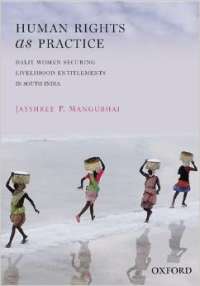 Mangubhai, Jayshree P. 2014. Human Rights as Practice: Dalit Women Securing Livelihood Entitlements in South India. New Delhi: Oxford University Press India. 304 pp. Hb: ISBN: 9780198095453
Mangubhai, Jayshree P. 2014. Human Rights as Practice: Dalit Women Securing Livelihood Entitlements in South India. New Delhi: Oxford University Press India. 304 pp. Hb: ISBN: 9780198095453
This book investigates how Dalit women in rural south India secure livelihood entitlements by analysing processes of social exclusion as well as collective action by these women. The complexities of this process are analysed through three ethnographic case studies set in the south Indian state of Tamil Nadu. The case studies offer insights into the (re)conceptualisation of human rights and strategies to secure rights-based freedoms and entitlements that aim to transform historically and contextually specific relations of subordination. The findings of this research thus contribute to bridging the divide between human rights law and its practice as embodied in collective struggle.
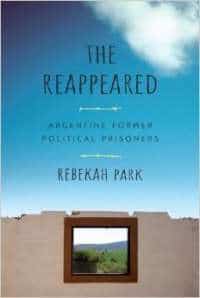 Park, Rebekah. 2014. The Reappeared: Argentine Former Political Prisoners. New Brunswick: Rutgers University Press. 192 pp. Pb: $29.95. ISBN: 9780813568546
Park, Rebekah. 2014. The Reappeared: Argentine Former Political Prisoners. New Brunswick: Rutgers University Press. 192 pp. Pb: $29.95. ISBN: 9780813568546
Between 1976 and 1983, during a period of brutal military dictatorship, armed forces in Argentina abducted 30,000 citizens. These victims were tortured and killed, never to be seen again. Although the history of los desaparecidos, “the disappeared,” has become widely known, the stories of the Argentines who miraculously survived their imprisonment and torture are not well understood. Using ethnographic methods, anthropologist Rebekah Park explains the experiences of these survivors of state terrorism and in the process raises challenging questions about how societies define victimhood, what should count as a human rights abuse, and what purpose memorial museums actually serve. The Reappeared challenges readers to rethink the judicial and legislative aftermath of genocide and forces them to consider how much reparation is actually needed to compensate for unimaginable—and lifelong—suffering.
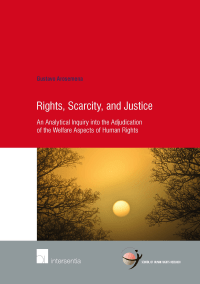 Solorzano, Gustavo A. 2014. An Analytical Inquiry into the Adjudication of the Welfare Aspects of Human Rights. Utrecht: School of Human Rights Research. volume 65. xii + 124 pp. Pb: ISBN: 978-1-78068-275-4.
Solorzano, Gustavo A. 2014. An Analytical Inquiry into the Adjudication of the Welfare Aspects of Human Rights. Utrecht: School of Human Rights Research. volume 65. xii + 124 pp. Pb: ISBN: 978-1-78068-275-4.
The book studies the possibilities of judicial engagement with matters of welfare in situations of scarcity. First, it isolates the real problems that such forms of judicial engagement entail. Afterwards, it presents three distinct strategies for protecting welfare duties judicially: reasonableness, prioritization and deliberative democratic dialogue. Reasonableness is based on the practice of reasonableness review present in the Constitutional Court of South Africa. By contrast, prioritization and deliberative democratic dialogue constitute more novel alternatives to reasonableness that are loosely inspired in various developments in comparative constitutional law. Finally, it discusses the relative merits and demerits of these strategies in an analytical framework based on qualitative comparative analysis.
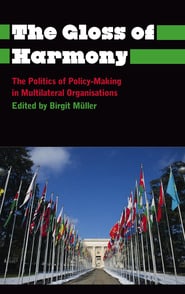 Müller, Birgit. 2013. The Gloss of Harmony: The Politics of Policy-Making in Multilateral Organisations. London. Pluto Press. 280pp. ISBN: 9780745333748.
Müller, Birgit. 2013. The Gloss of Harmony: The Politics of Policy-Making in Multilateral Organisations. London. Pluto Press. 280pp. ISBN: 9780745333748.
The Gloss of Harmony focuses on agencies of the United Nations, examining the paradox of entrusting relatively powerless and underfunded organisations with the responsibility of tackling some of the essential problems of our time. The book shows how international organisations shape the world in often unexpected and unpredictable ways. The authors of this collection look not only at the official objectives and unintended consequences of international governance but also at how international organisations involve collective and individual actors in policy making, absorb critique, attempt to neutralise political conflict and create new political fields with local actors and national governments. The Gloss of Harmony identifies the micro-social processes and complexities within multilateral organisations which have, up to now, been largely invisible. This book will have wide appeal not only to students and academics in anthropology, business studies and sociology but also to all practitioners concerned with international governance.


